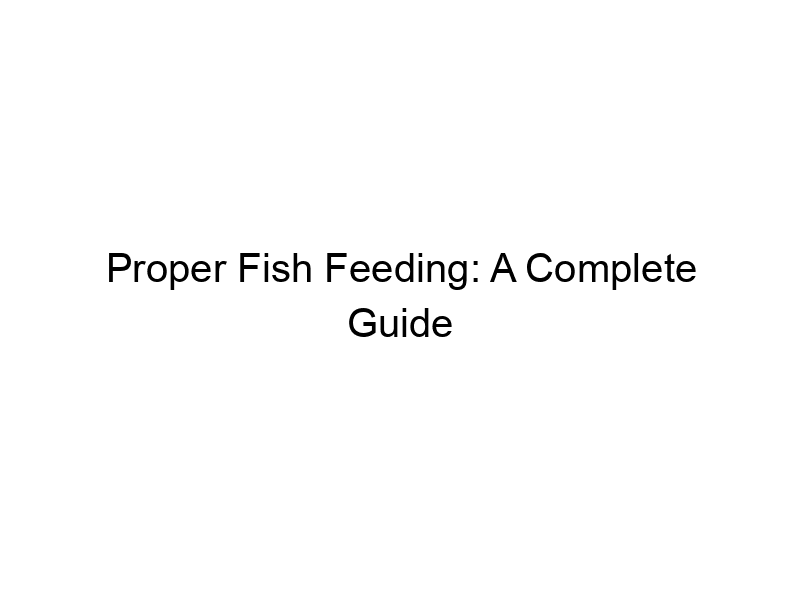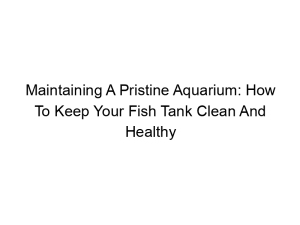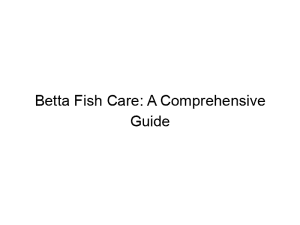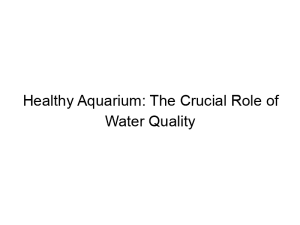Watching your fish swim gracefully in their aquarium is a rewarding experience. However, ensuring their health and longevity requires more than just pretty decorations and a clean tank. The cornerstone of responsible fishkeeping is proper fish feeding. This comprehensive guide will walk you through everything you need to know, from understanding your fish’s dietary needs to avoiding common feeding mistakes. We’ll cover feeding schedules, appropriate food types, recognizing signs of overfeeding or malnutrition, and much more. Prepare to become a fish-feeding expert!
Knowing your fish’s species is paramount. Different fish have vastly different dietary requirements. For instance, carnivorous fish like bettas thrive on live or freeze-dried foods, while herbivorous fish like goldfish require a diet rich in plant matter. Researching your specific fish species is the first step in providing proper nutrition.
Analyzing Food
Labels
Food labels can be deceptive. Look for protein percentages, fat content, and the inclusion of essential vitamins and minerals. Avoid foods with fillers like artificial colors or preservatives. A high-quality fish food will clearly list its ingredients and nutritional content. Compare different brands to find the best fit for your fish’s needs.
Choosing the Right Fish Food
Types of Fish Food: Flakes, Pellets, and More
Flake foods are convenient and readily available, but they often contain fillers. Pellets are usually more nutritious and less prone to water pollution. Live foods like bloodworms or brine shrimp offer a nutritional boost and can enrich your fish’s diet. Freeze-dried foods are a convenient alternative to live foods. Consider your fish’s preferences and dietary requirements when making your selection.
The Importance of Variety
Just like humans, fish benefit from a diverse diet. Mixing up their food keeps their meals interesting and helps to ensure they receive a wider range of nutrients. Rotating between different types of food, such as flakes, pellets, and occasional live or frozen treats, is beneficial for maintaining their health and preventing nutritional deficiencies.
Developing a Proper Feeding Schedule
How Often Should You Feed Your Fish?
Overfeeding is a common mistake among fish keepers. Most fish should be fed once or twice a day, with the amount of food being no more than they can consume in a few minutes. Observe your fish after feeding; any leftover food should be removed immediately to prevent water quality issues.
Adjusting Feeding Based on Fish Size and Species
Smaller fish require smaller portions, while larger fish naturally need more food. Different fish species also have varying metabolic rates, influencing how frequently they need to be fed. A juvenile fish may require more frequent feedings than a fully grown adult. Consider the size, age, and species of your fish when determining the feeding schedule.
Recognizing Signs of Overfeeding and Underfeeding
Signs of overfeeding include cloudy water, uneaten food lingering in the tank, and lethargy in your fish. Underfeeding is shown through weight loss, lethargy, and a dull appearance in your fish. Regular observation is crucial.
Maintaining Water Quality
The Link Between Feeding and Water Parameters
Uneaten food quickly decomposes, releasing harmful ammonia and nitrites into the water. This can lead to toxic levels and seriously affect your fish’s health. Regular water changes and maintaining proper filtration are crucial for managing water quality.
Understanding Fish Nutrition
Essential Nutrients for Fish Health
Fish, like all animals, require a balanced diet containing essential proteins, fats, carbohydrates, vitamins, and minerals. Proteins are essential for building and repairing tissues, while fats provide energy and support various bodily functions. Carbohydrates serve as an energy source. Vitamins and minerals are crucial for overall health and proper bodily processes. Each nutrient plays a vital role in your fish’s wellbeing.
The Role of Protein in a Fish’s Diet
Protein is a critical component of a healthy fish diet, providing the building blocks for growth and repair. The protein content of fish food should be high enough to support their growth and maintain overall health.
Specialized Diets for Specific Needs
Feeding Sick or Injured Fish
Sick or injured fish may require a modified diet. Consult a veterinarian for tailored advice. They might suggest easily digestible foods, such as soaked pellets, or a specialized medicated diet.
Breeding and Raising Fry
Raising fry requires a specific diet tailored to their developmental stage. They often need smaller, higher-protein food than adult fish. Specialized fry food is available in pet stores.
Common Feeding Mistakes
Overfeeding: Causes and Consequences
Overfeeding is the most common feeding mistake, leading to water pollution, bacterial growth, and various health problems. Start with small amounts of food and adjust as needed.
Feeding the Wrong Type of Food
Feeding unsuitable food can lead to nutritional deficiencies and digestive issues. Research your fish species to understand their dietary needs. Avoid giving human food to your fish, as it lacks the essential nutrients and can upset their digestive system.
Enriching Your Fish’s Diet
Incorporating Live and Frozen Foods
Occasionally supplementing with live or frozen foods like bloodworms, brine shrimp, or daphnia provides a nutritional boost and adds variety to your fish’s diet. These foods are often higher in protein and essential fatty acids.
Advanced Fish Feeding Techniques
Target Feeding
Target feeding involves placing the food precisely where your fish can easily reach it. This technique is useful for feeding shy fish or fish in densely planted tanks, ensuring that the food gets to the intended fish and minimizes the amount of uneaten food.
Fasting Your Fish
Occasionally fasting your fish (once a week or so) can benefit their digestive system and overall health. Always monitor your fish closely during fasting periods and ensure they do not show signs of starvation.
Tools and Equipment for Feeding
Fish Food Dispensers
Automatic fish feeders are a valuable tool for consistent feeding, especially for those who are often away from home. They prevent overfeeding and ensure your fish receive food even when you are not around.
Troubleshooting Feeding Problems
Dealing with Picky Eaters
Some fish are naturally more selective with their food. Try offering different types of food and different feeding methods to discover what works best for your picky eater.
Building a Healthy Aquarium Ecosystem
The Importance of a Clean Tank
A clean tank is essential for the health of your fish. Regular water changes and proper filtration help to prevent the buildup of harmful waste products from uneaten food.
Frequently Asked Questions
What are the signs of a malnourished fish?
Malnourished fish often appear thin, have sunken bellies, and show a loss of vibrancy in their colors. They may also be lethargic and less active than usual.
How often should I clean my fish tank?
The frequency of cleaning depends on the size of your tank and the number of fish you have, but generally, partial water changes (25-50%) should be done weekly or bi-weekly.
Can I feed my fish human food?
While some human foods might seem appealing, most are not suitable for fish and can lead to health problems. Stick to commercially available fish food designed for your species.
What should I do if my fish is refusing food?
If your fish is consistently refusing food, it may be unwell. Observe for any other symptoms and consult a veterinarian. Also check your water quality.
How do I know if I am overfeeding my fish?
Uneaten food leftover in the tank after a few minutes is a clear sign of overfeeding. This can cause water quality issues and endanger your fish.
My fish are fighting over food. What can I do?
If your fish are fighting over food, try target feeding or increasing feeding frequency with smaller portions. Consider adding more hiding places in the tank to reduce competition.
Final Thoughts
Proper fish feeding is crucial for maintaining the health and wellbeing of your aquatic companions. By understanding your fish’s dietary needs, selecting appropriate food, and establishing a consistent feeding schedule, you can ensure their long-term health and happiness. Remember to observe your fish regularly, maintain water quality, and don’t hesitate to seek professional advice if you encounter any problems. Happy fishkeeping!




